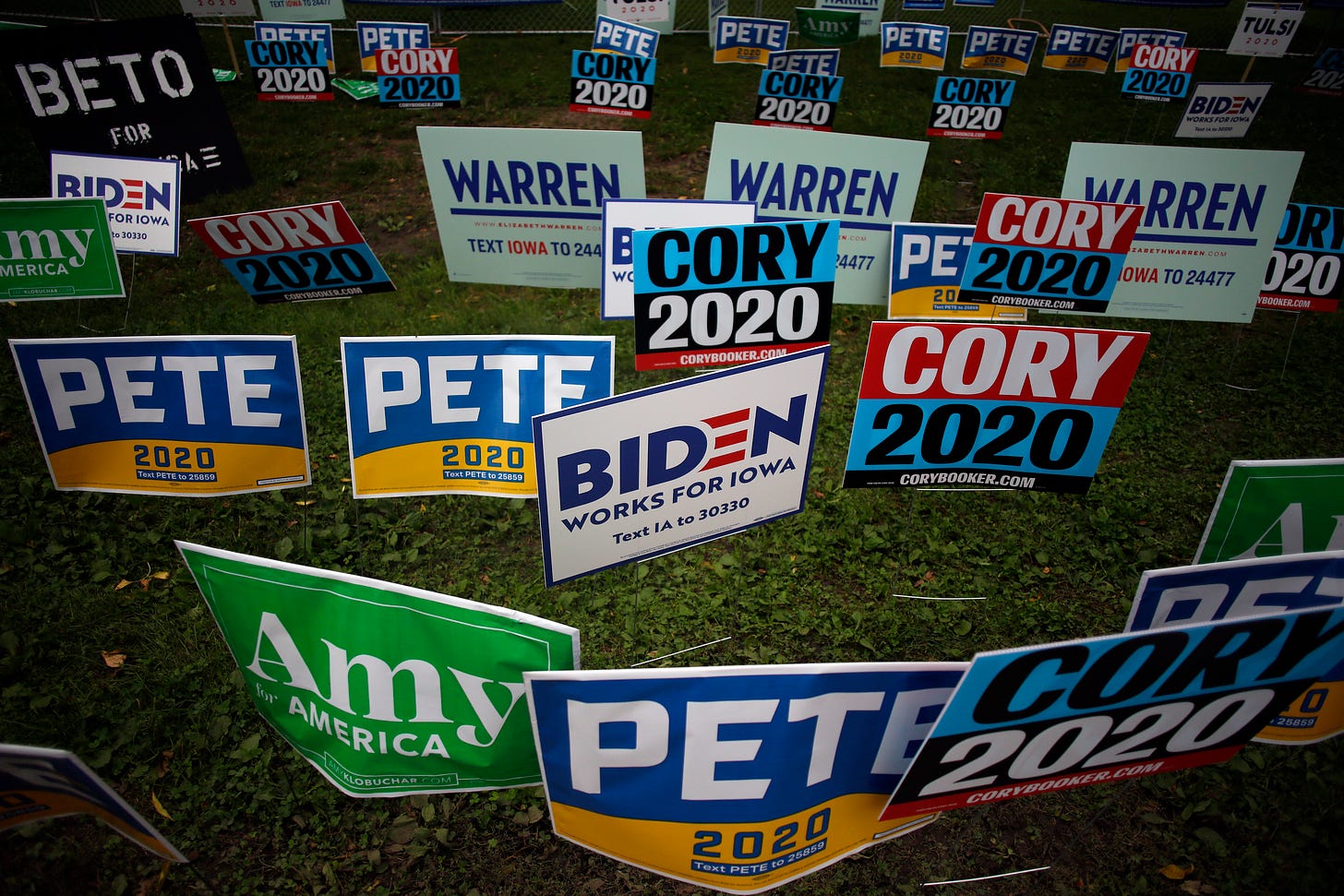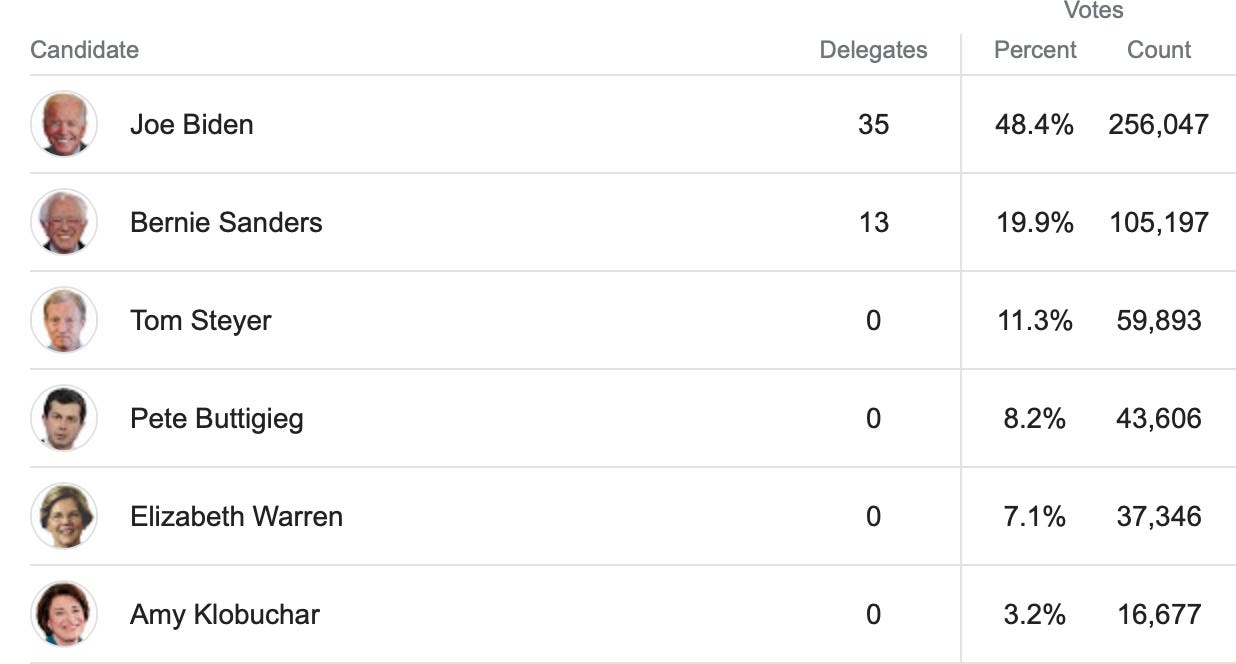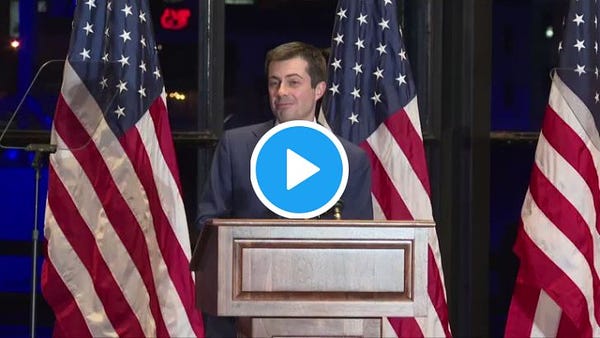Democratic Primary Election Results
Every winner, date, summary and link you will ever need for the upcoming 2020 Democratic Primary Race
Welcome to Shero and another free weekly post from Amee Vanderpool that gets you exclusive independent content from a female driven perspective that connects the dots for the masses. If you haven’t already, please complete a paid subscription to keep this good thing going and receive access to all of the subscriber-only content only available behind the paywall.
Below is a complete list of every Democratic Primary race with key dates, deadlines and results for the Democratic Presidential Primary race. I will update it constantly with new information as it becomes available. I will start with the beginning of the Primary Season in February and work forward, so you will need to scroll down to access the most current event, depending on where we are in the timeline. If you are receiving this by email, you will always want to refresh the post to get the most updated version. Be sure to bookmark this page for reference.

(Democratic presidential campaign signs are displayed during the Democratic Polk County Steak Fry on September 21, 2019 in Des Moines, Iowa. Photo by Joshua Lott via Getty Images.)
February 2020
Feb. 3: Iowa Democratic Caucus
There was a lot of confusion and a little bit of error and for more detail, read What Went Wrong In Iowa. Here are the final results:

(Source: Associated Press.)
Feb 11: New Hampshire Democratic Primary
Bernie Sanders edged out Pete Buttigieg for a win in New Hampshire, which wasn’t unexpected given Vermont’s proximity and his result in 2016. Sanders’ margin for a win was much lower than in 2016, likely due to the number of candidates who are still in the field at this point. Buttigieg will pull even with Sanders in the overall delegate count for this vote, but still maintains a slight edge in the overall delegate count so far. Worth noting: Amy Klobuchar finished in a strong and surprising third-place, giving her lots of fundraising opportunities and opening up a new two-person race with Buttigieg for the moderate lane in the Democratic presidential primary.
February 22: Nevada Democratic Caucuses
How does the Nevada Caucus work?
Early voting: There are four days of in-person early voting from February 15 to 18. These early voters will use ranked-choice voting, meaning that they will rank their top candidates in order of preferences. All early-vote participants must pick at least three and up to five candidates and rank them in order of preference. This process has had overwhelming turnout so far.
Strip Caucuses: Businesses in Las Vegas employ a large number of Nevada voters, so the “strip caucuses” let workers participate who may not be able to make it to a precinct caucus with a caucus closer to work. These take place on the same day as the traditional caucuses, on Saturday, February 22.
Traditional Caucuses: These are over 250 locations across Nevada, where participants will fill out a presidential preference card with their first choice for president. If your first-choice candidate doesn't attract 15% support from the caucus-goers (which is known as reaching the "viability threshold"), you can "realign," that is, pick another candidate who already has at least 15% support or join other voters to help someone else become viable.
Early votes are added in: The early votes are then added in during the first vote tally. After the initial tally, any supporters who received less than a certain threshold for the vote will be eliminated, and voters can shift to different candidates. For those early voters, the second and third preferences will be taken into account if their first preference falls short of the 15% threshold and is "nonviable."
How a candidate wins delegates: A candidate must meet the viability threshold in the precinct caucuses, which is 15% for precincts electing four or more delegates. For those electing two delegates, the threshold is 25%. For those electing three delegates, the threshold should be one-sixth of the attendees.
Nevada is different from Iowa: The Nevada Democratic Party will load raw early vote totals by candidate for each precinct using a secure tabulation method. Precinct chairs will receive iPads that are pre-loaded with the new tool to tabulate the vote and the teams will not be using the app used in Iowa. To determine viability in each precinct, the chair will add the total number of in-person attendees to total number of early vote participants to determine viability.
RESULTS: Bernie Sanders won the Nevada Caucuses with 46.8% of the vote and 22 total delegates. Second place went to Joe Biden with 20.2% and he obtained seven delegates. Pete Buttigieg had 13.3% of the vote and got three delegates. Elizabeth Warren had 9.7% of the vote and Tom Steyer had 4.75 — neither candidate will receive delegates.
February 29: Joe Biden has a decisive win in South Carolina, giving his campaign a much needed resurgence.
TOM STEYER OUT: After the race in South Carolina is called, billionaire Tom Steyer makes the announcement the he is dropping out of the presidential race.

(Via Associated Press.)
March 2020
PETE BUTTIGIEG OUT: Just ahead of Super Tuesday on March 2, Pete Buttigieg announces that he is suspending his campaign, despite having the money to continue and citing the need to unify the party.


AMY KLOBUCHAR OUT: On the afternoon of March 2, just after Buttigieg and before Super Tuesday, Amy Klobuchar announces that she is suspending her campaign and will be endorsing Joe Biden.
March 3: Super Tuesday
Alabama: This was an open primary last night and will pledge 52 delegates overall. Out of this total delegate count, 34 delegates are allocated by congressional district and 18 are at large (determined by Tuesday’s primary election). Seven of those at large delegates are PLEO pledged — PLEO means delegates who are pledged and are party leaders and elected officials. Alabama also has nine super-delegates, which is an unelected delegate who is free to support any candidate for the presidential nomination at the party's national convention. Joe Biden is the projected winner of Alabama and will get 40 delegates, Sanders will get 7 and Bloomberg will take 1.
American Samoa: Voters in American Samoa are not eligible to vote in the general election, but they can vote in presidential primaries. The territory has an open primary with six delegates, which are all at large and five superdelegates. Bloomberg is the winner here with 49.9% of the vote and will get at least four delegates. Tulsi Gabbard, who was born in American Samoa, received 29.3% and one delegate.
Arkansas: This was an open primary with 31 delegates — 20 are allocated by congressional district and 11 are at large, of which four are PLEO pledged. The state also has five superdelegates. Joe Biden won Arkansas and will get 16 delegates. Sanders came in second and will get 8 and Bloomberg finished third and will get 4.
California: This is the big one with 415 delegates, the most of any state. 271 are allocated by congressional district and 144 are at large. Of those 144, 54 are PLEO pledged. California also has 79 superdelegates, making the total delegate count 494. Sanders leads Biden by 8.9 percentage points with 80% of precincts reporting so far. This looks like a win for Sanders.
Colorado: This was a modified primary with 67 delegates total. There are 44 delegates allocated by congressional districts, 23 at large delegates (nine of which are PLEO pledged) and 13 superdelegates. Bernie Sanders is the projected winner of Colorado and will get at least 20 delegates. Biden and Bloomberg will get at least 9 delegates.
Democrats Abroad: Those living overseas have an open caucus that kicks off voting for Super Tuesday. The group gets 13 delegates, all of which are at large and one of which is PLEO pledged. They also get four superdelegates. Results here are still pending.
Maine: has a closed primary with 24 delegates, 16 of which are allocated by the state's two congressional districts. The state has eight at large delegates, three of which are PLEO Pledged and eight superdelegates. Results in Maine are still pending.
Massachusetts: This race is a modified primary with 91 total delegates — of this total, 59 are allocated by congressional districts, 32 are at large delegates with 12 PLEO pledged and 23 superdelegates. The projected winner in Massachusetts is Joe Biden, who will get at least 34 delegates. Sanders will get at least 26 delegates and Elizabeth Warren will take at least 17.
Minnesota: This is a closed primary with 75 delegates — 49 of these are allocated by congressional district and 26 are at large, with 10 PLEO pledged. Minnesota also has 17 superdelegates. The projected winner here is Joe Biden who will get at least 38 delegates. Sanders will get at least 26 delegates and Warren will take at least 10.
North Carolina: This is another modified primary with 110 total delegates — 72 are allocated by congressional district and 38 are at large. Of the at large delegates, 14 are PLEO pledged and the state also has 12 superdelegates. Joe Biden is the projected winner of North Carolina and is expected to take at least 14 delegates from this win.
Oklahoma: This is a modified primary with 37 total delegates, 24 of which are allocated by congressional district. The state has 13 at large delegates and five these are PLEO pledged. It also has five superdelegates. Joe Biden is the winner here and will take 21 delegates, Sanders will get 13 and Bloomberg will get 3.
Tennessee: This is an open primary with 64 delegates overall. Of this amount, 42 are allocated by congressional districts, 22 are at large delegates and eight are PLEO pledged. The state has nine superdelegates. Joe Biden is the projected winner in Tennessee and will get 28 delegates from this race. Sanders will take 15, Bloomberg will get 7 and Warren will get 1.
Texas: This is another big race for candidates with Texas 228 total delegates up for grabs, the second largest of the night next to California. There are 149 delegates allocated by congressional district, 79 are at large and 30 of those are PLEO pledged. Texas also has 34 superdelegates. With 92% reporting so far, Joe Biden looks like the projected winner for Texas. The delegate result will look like a fairly even split with Biden getting at least 56 delegates, Sanders getting at least 50 and and Bloomberg getting 4.
Utah: This is a closed primary with 29 total delegates — 19 of them are allocated by congressional district, 10 are at large and four of those are PLEO pledged. The state also has six superdelegates. With 71% percent reporting, Bernie Sanders is the projected winner in Utah and will get at least 9 delegates. Bloomberg will take at least two delegates and Biden will get at least one.
Vermont: This is an open primary with 16 total delegates — 11 are allocated by congressional district, five are at large and two of those are PLEO pledged. The state also has seven superdelegates. This is Bernie Sanders’ home state and predictably will go in the win column for him. Sanders will get 11 delegates, while Biden will take five.
Virginia: This is an open primary with 99 delegates — 65 of those are allocated by congressional district and 34 are at large, with 13 of those being PLEO pledged. The state also has 25 superdelegates. Virginia was a resounding win for Joe Biden who will take 66 delegates. Sanders will get 32 delegates and Warren will get two.
Delegate Counts So Far
Biden: 388
Sanders: 322
Bloomberg: 44
Warren: 42
Gabbard: 1
Still to be awarded based on final results: 536
March 10: This is another big voting day for several states including primary elections in Idaho, Michigan, Mississippi, Missouri and Washington. North Dakota will also caucus on this day. Pay close attention to Michigan here to give us a glimpse of who fares well in the suburban midwest, particularly with African-American and working-class white voters. This could be the day that decides things if the candidate has not already been determined after Super Tuesday.
March 17: Primary Elections will be held for Arizona, Florida, Illinois and Ohio. If one candidate sweeps the larger states, there will be immense pressure on the other candidates to exit the race.
March 24: Georgia Primary Election
March 29: Puerto Rico Primary Election
April 2020
April 4: Primary Elections for Alaska, Hawaii and Louisiana with Wyoming holding its Democratic Caucuses.
April 7: Wisconsin Primary Election
April 28: Primary Elections for Connecticut, Delaware, Maryland, Pennsylvania, Rhode Island and New York. This could be the final last big delegate election for the entire primary race. If one candidate dominates every state this late in the primary, this could likely end the race as party leaders will move to support the leading candidate.
May 2020
May 2: Primary Election for Kansas and Guam
May 5: Indiana Primary Election.
May 12: Primary Elections for Nebraska and West Virginia
May 19: Primary Elections for Kentucky and Oregon
June 2020
June 2: Primary Elections for District of Columbia, Montana, New Jersey, New Mexico and South Dakota.
June 6: Virgin Islands Democratic Caucuses
July 2020
July 13-16: Democratic National Convention in Milwaukee, Wisconsin, a key Midwestern battleground state.
August 2020
Aug 24-27: Republican National Convention in Charlotte, North Carolina.
September 2020
Sept. 29: The first Presidential Debate will be held at University of Notre Dame, Indiana
October 2020
Oct. 7: The first Vice Presidential Debate will be held at the University of Utah in Salt Lake City, Utah.
Oct. 15: The second Presidential Debate will be held at the University of Michigan in Ann Arbor, Michigan.
Oct. 22: The third Presidential Debate will be held at Belmont University in Nashville, Tennessee.
November 2020
Nov 3: Election Day




Why can't we have primary day? I really feel as the primary season goes on, less people vote. Even though everyone is still on the ballot, I really think some don't vote if their candidate isn't fairing well.